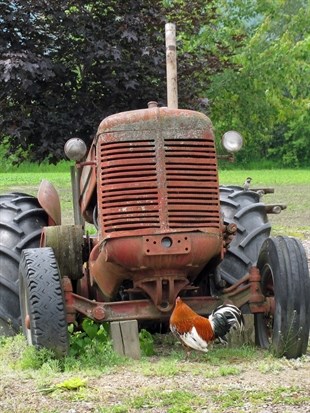
Agriculture has played an important historical role in the Kamloops region and the city is hoping to keep it important in the future as well.
(JENNIFER STAHN / iNFOnews.ca)
April 18, 2013 - 11:48 AM
Agriculture has a long and vibrant history in Kamloops and the city is looking at ways to best reestablish itself as a hub city for agriculture production, processing and distribution.
Agriculture as we know it – the actual planting, growing and harvesting of specific crops – began in the mid-1800s with forage grasses and potatoes but quickly grew to accommodate other “kitchen garden” items such as peas, carrots and onions as well as livestock herds.
The first agricultural association was formed in 1892 and three years later canning and preserving became popular as an industry. By the early 1900s orchards had been planted and were growing in popularity.
As agriculture grew in popularity in the Kamloops area the need for irrigation became clear and other essential technologies, like a grain elevator, were adopted by farmers in the region.
Agricultural practices continued to grow in the region, until 1949 when cold weather ruined many crops – including 75 per cent of apple trees in Brocklehurst – forcing many orchards and market farms to close. Over the coming years canneries would start to close and 1961 was a particularly bad year for commercial vegetable crops as the industry saw a drop in overall acreage from 876 acres in 1951 to only 238.
In 1973 agricultural land reserve designations were recognized as priority use and non-agricultural uses were to be controlled within those zones. Within five years the Kamloops Farmers' Market was established as a way to support local food production and in 1984 the first community garden opened on Crestline Street. In 1995 the Kamloops Food Policy Council was established and in 2000 a study examining alternative crops for small acreages was commissioned.
Over the coming years the food and farming industries continued to evolve through safety regulations and the desire to support local food production and in 2007 a background report for the city supported the development of an urban agriculture strategy.
2010 saw the closing one of the last remaining apple orchards in Kamloops and the promotion of farm-to-table living through urban farms adjacent to residential areas found legs in the city through Tranquille on the Lake.
That year also saw the B.C. Cattleman's Association move annual meetings to Williams Lake after more than 80 years in Kamloops and the following year the Provincial Winter Fair moved to Barriere after 72 years in Kamloops.
The Sustainable Kamloops Plan outlined the need to identify viable agricultural land and opportunities for increased food production and processing. 2012 saw the city began looking at an Agriculture Area Plan that would promote and protect long-term sustainability of local agriculture and local producers.
The city is now looking to establish an updated and more defined set of policies to protect and promote agriculture and encourage sustainable agricultural practices. The plan will focus on the community's farm areas to identify opportunities and practical solutions where agriculture can be strengthened and ultimately contribute to the community's long-term sustainability.
Partnerships with agri-science students at Thompson Rivers University and surveys of producers, consumers and food retailers have helped guide the document.
City staff are looking for input on the Agriculture Area Plan and is offering roadshow presentations for any interested groups. Staff have already been out in the community presenting progress on the plan and is continuing to offer the roadshows as way to culminate more feedback from the community.
“Within the development stages of the Agriculture Area Plan, the city's commitment to build a strong working partnership with the local ranchers and farmers has been greatly beneficial - their personal experiences and insight combined with the city's intentions of building a guiding document to support local agriculture is a win-win,” commented Coun. Nelly Dever, who sits on the Agriculture Advisory Committee.
Presentations are available between now and the first week of May by emailing Maren Luciani at mluciani@kamloops.ca or calling 250-828-3568. Further information – including background information and a timeline of the plan - can also be found on the city website.
There will be another public consultation phase in early summer 2013 and the plan is anticipated to go to council for adoption in fall.
To contact a reporter for this story, email jstahn@infotelnews.ca or call (250) 819-3723.
News from © iNFOnews, 2013